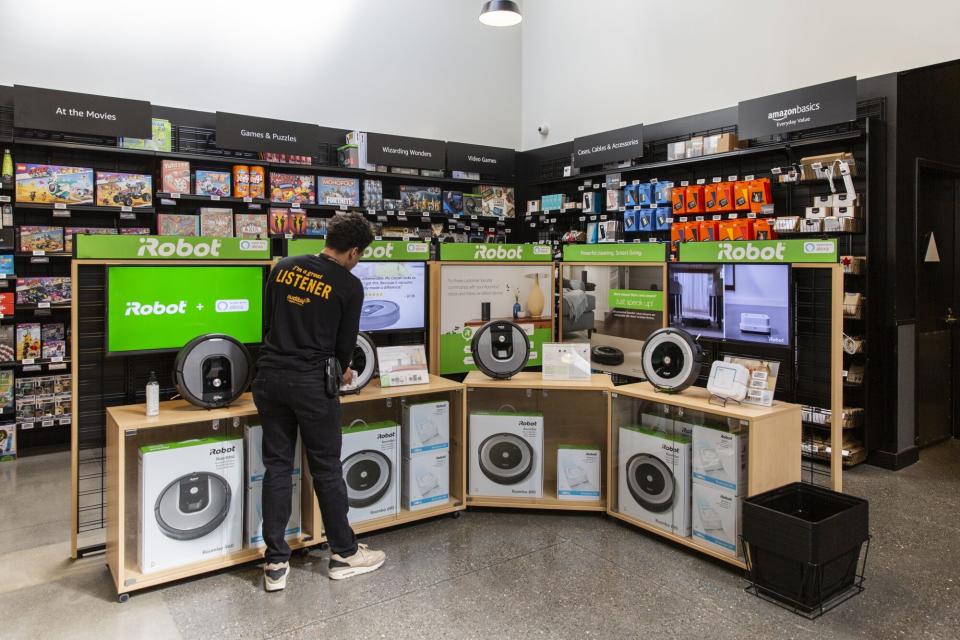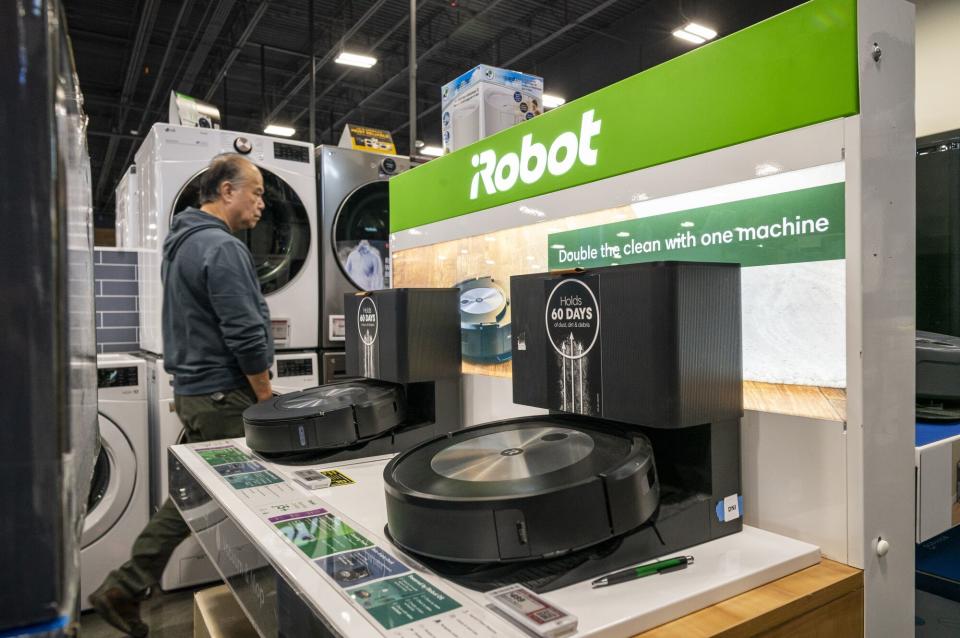Amazon’s $1.4 Billion iRobot Deal to Be Blocked by EU Antitrust Watchdog
(Bloomberg) -- Amazon.com Inc.’s proposed $1.4 billion acquisition of Roomba maker iRobot Corp. is expected to be blocked by the European Union’s antitrust regulator over concerns that the deal will harm other robot vacuum makers.
Most Read from Bloomberg
Russia Says Ukraine Downed Plane Carrying Prisoners for Swap
Trump Races Toward 2024 Biden Rematch After New Hampshire Win
Apple Dials Back Car’s Self-Driving Features and Delays Launch to 2028
China Boosts Stimulus by Allowing Banks to Keep Smaller Reserves
The e-commerce giant was told the deal was likely to be rejected at a meeting Thursday with officials from the European Commission, according to people familiar with the matter. A final decision still needs formal approval from the EU’s political leadership and is due by Feb. 14.
Amazon declined to comment. Shares in Bedford, Massachusetts-based iRobot sank as much as 31% to $16.30 on Friday widening the deal spread to more than $35, the widest level since the merger announced more than a year ago.
The Wall Street Journal first reported the expected decision from the meeting.
The deal is likely to face opposition in the US as well. According to people familiar with the matter, the Federal Trade Commission has been drafting a lawsuit that would seek to block the acquisition. The FTC’s three commissioners haven’t yet voted on a challenge nor had a final meeting with Amazon to discuss the potential case, said the people, who asked not to be named discussing an ongoing probe.
It was widely expected that the EU commission would oppose the deal after it expressed concerns last month that Amazon might be tempted to use its dominant position as an online retailer to favor iRobot products over those of competitors. EU interim competition chief Didier Reynders said Amazon had to pledge fair treatment to all robot vacuums offered on its platform.
Amazon declined to make concessions to allay the EU’s concerns. Instead, the e-commerce firm is already prepping a legal challenge to the commission’s decision, according to a person familiar with the matter.
It would be the second major tech merger blocked in recent months by the EU regulator, which nixed Booking Holdings Inc.’s €1.6 billion ($1.7 billion) bid for Sweden’s Etraveli Group in September. Booking is appealing that decision.
The EU’s opposition to its iRobot acquisition highlights the tension between Amazon’s retail operations and its ambitions for the smart-home ecosystem built around its Alexa voice assistant. The FTC has also expressed concern that the deal would give Amazon too much control over the smart-home device market and potentially violate users’ privacy by giving the company access to data on their homes.
Analysts say the EU’s decision is a relatively minor setback for Amazon, which has the resources to pursue alternatives to the deal. “Amazon can continue to pursue a home connectivity strategy, even without iRobot,” Gil Lauria of D.A. Davidson & Co. said in an interview, adding, “This is a very small deal for a very large company.”
The stakes for iRobot are potentially greater. The company, which pioneered robot vacuums, has seen demand for its products fall by nearly half since a 2021 pandemic peak in the face of growing competition from lower-priced manufacturers. Shares in the company have been falling for months on fears that the deal would be blocked. Last year, it was forced to secure a $200 million financing facility, and Amazon cut its per-share offer by about 15%.
The EU’s decision again puts it at odds with the UK’s antitrust watchdog, which gave the deal the green light after finding it would have limited competitive impact on the British market. The UK Competition and Markets Authority also split with its European counterpart by approving the Booking deal and, at least initially, blocking Microsoft Corp.’s acquisition of Activision Blizzard Inc. The CMA later reversed its position on the Microsoft-Activision deal.
When Amazon announced its intention to buy iRobot in 2022, the acquisition was seen as a way for the e-commerce giant to expand its presence in the burgeoning market for smart-home gadgets. Besides baking its Alexa voice assistant into multiple devices, the company has fielded a personal robot named Astro.
Early in its development, Astro struggled to map and navigate homes with complicated or unusual layouts, something iRobot has been working on for years with Roombas. Astro remains available only to invited buyers more than two years after its introduction, and Amazon now plans to sell a security guard version to businesses, Bloomberg reported in November.
Though small for a company the size of Amazon, an iRobot acquisition would be the fourth-biggest in its history, trailing only its purchases of Whole Foods Market, movie studio MGM and the One Medical concierge healthcare service.
More broadly, Luria said the deal-making climate for Big Tech has soured. “It’s hard for large technology companies to acquire anything right now. And it’s likely to become harder. There’s a global – or let’s say at least a trans-Atlantic – alliance around preventing technology companies from expanding through acquisition, and thus limiting competition.”
--With assistance from Alexandra Muller and Matt Day.
(Updates with shares on market open and deal spread in the third paragraph)
Most Read from Bloomberg Businessweek
Goldman, Lazard Look to Ex-Spies to Gain an Edge in Volatile World
Hong Kong’s High Rents Create a New Type of Cross-Border Commuter
©2024 Bloomberg L.P.



